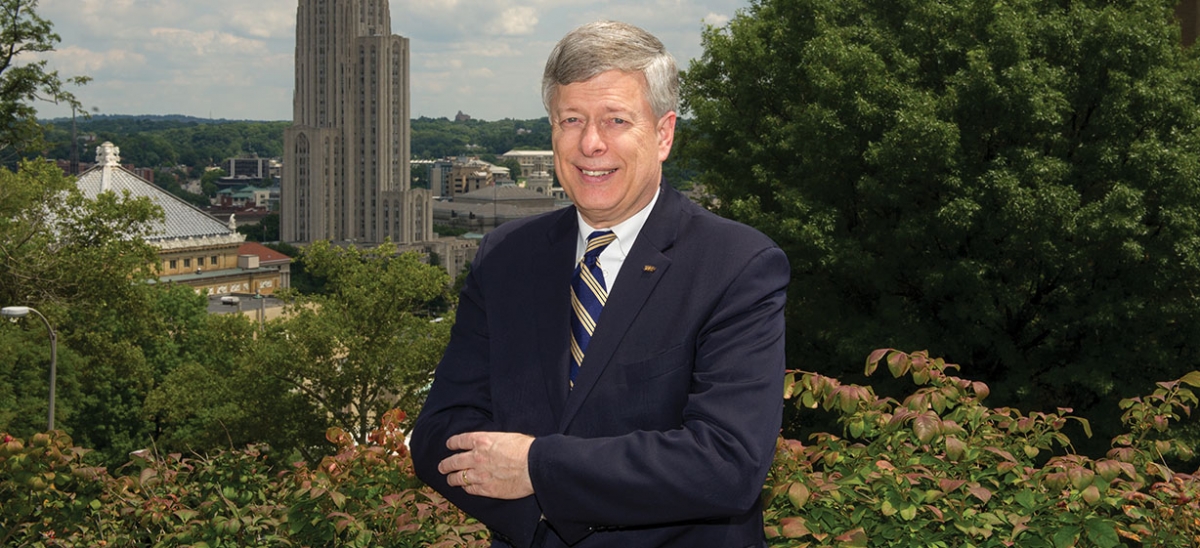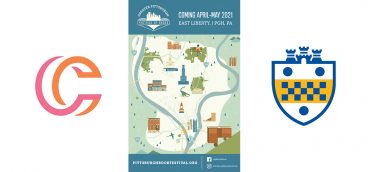Mark A. Nordenberg, Professor of Law & University Administrator

Minnesota is the ‘Land of 10,000 Lakes,’ and northern Minnesota, where I was born and raised, has more than its share. Because Duluth, my hometown, was built on a hill, we had a scenic view of Lake Superior from our home. To me, it was like an ocean. Duluth was a great place to be a kid, and the 1950s and ’60s was perhaps the best time.
My father was an only child born of Swedish immigrants, and my mother had one sister who had no children, so my brother, sister and I were the only grandchildren on either side of the family. All of my grandparents lived just across the tip of the lake in Superior, Wis., and we were very close. But when my father told us during the summer before my senior year in high school that we had to move to Pittsburgh because he was being transferred there by U.S. Steel, we were not happy. I still have images of the five Nordenbergs huddled together wondering what this big, dirty city to the east had in store for us.
When we arrived, however, we loved it. We were taken with the city’s rich history and energized by the fact that this was a place of such activity and impact. We enjoyed the natural beauty that is part of and surrounds the city. And most of all, we really loved the people. Pittsburghers are the perfect blend of Midwestern values and Eastern spark, and without question, moving here was one of the best developments in my life. In a broad sense, it marked my entry into the larger world. Years later, when I went back to Duluth for a school reunion, I remember thinking about how things might have been different had I stayed there. Many people I had known were still in Duluth. They were married to each other and seemed happy, and I was glad for that. But I was also glad that I had moved on.
I spent my senior year in the North Hills, graduated from North Allegheny High School, and went on to Thiel College, a small Lutheran school about 90 minutes from Pittsburgh. It was a good place for me because it gave me early opportunities to experience success. I could not have been a successful cross-country runner at a place like Pitt, but I could letter my freshman year at Thiel. I could also decide during my senior year that I wanted to be a debater and simply join the team. And I had great faculty mentors there, as well. Most important, however, I met my wife, Nikki Pirillo, at Thiel, and marrying her turned out to be the best decision of my life. I was 19 and she was 17 when we met. We’ve been married for 43 years now, and to me, there’s no one quite like her. She is intuitively intelligent in ways that I am not. She can size up people and situations instantaneously. And she has been a wonderful mother. We have three great kids mainly because of her. (We also have three wonderful young grandsons.) But in retrospect, my decision to go to college in western Pennsylvania was based on a false premise. I wanted to stay near my family, so I went to school nearby. But as fate would have it, my parents and younger brother left for Chicago just after my freshman year when my father was transferred again, leaving my sister, who joined me at Thiel, and me behind. But just as our family had headed back to the true Midwest, after college, we did, too.
When I began law school at the University of Wisconsin in the late summer of 1970, it was almost as if the move from Greenville, Pa., to Madison, Wis., which sometimes was called the “Berkeley of the Midwest,” had transported me to another planet. It was the time of Vietnam War protests and great civil unrest. In fact, the month I started school, the Wisconsin Army Math Research Center was bombed and a young researcher was killed. There were constant and sometimes pitched battles between protesters and the National Guard on the hill just outside the law school. And I emerged from a successful first-year moot court oral argument feeling great—until I got tear-gassed. That’s just the way it was in those days.
Early on at Wisconsin, I had the good fortune of connecting with a professor who was teaching his very first class, Frank Tuerkheimer, who had come from the U.S. Attorney’s office in New York City. I guess he thought I had promise because, after my first semester, he invited me to be his research assistant. We ended up working together very closely for more than two years on a range of interesting issues. Frank was a committed environmentalist and we did some work for the U.S. Attorney in Madison developing new ways to enforce environmental laws. We took on a case for the Sierra Club that went all the way to the Seventh Circuit Court of Appeals. I learned a great deal from being around Frank, and it made me feel great to know that he had confidence in me. In fact, during my third year, he did something highly unusual. He sought permission from the federal court in Milwaukee to add my name to a legal brief, even though I had not yet been admitted to practice, because he thought that my contributions to it were significant enough to merit the credit.
There still was a military draft then, and I had received a direct commission into the Navy Judge Advocate General’s (JAG) Corps, which allowed me time to go to law school, earn a degree and get admitted to the bar. At the other end, however, I was looking at a longer commitment to the military than if I had chosen to serve in another way. So I finished law school and went on active duty. But both the war and the draft ended and, as things turned out, my service requirement was dramatically reduced. I found myself in Newport, R.I., and was able to think about possibilities for my longer-term future.
First, I interviewed with the biggest law firm in Providence, and it really impressed this young lieutenant (junior grade) when they asked me to meet with John Chafee, who had recently stepped down as Secretary of the Navy (and then went on to a great career in the U.S. Senate). Ultimately, however, I returned to the Midwest to practice law with a large and distinguished firm in Minneapolis. But memories of Frank Tuerkheimer still had a hold on me. As Frank’s assistant, I had a chance to see up-close what his life as a university faculty member was like and thought that at some point in my career I might like to try teaching law as he did. But after practicing for a little less than two years, I got a call from Frank, who by then had become a senior prosecutor with the Watergate Prosecution Special Task Force. He said, “We’re going to have an opening. It’s not in my area, so I can’t hire you. But I can connect you with the right people. You should come down and talk to them.” So off I went to Washington, D.C. I stayed with the Tuerkheimers and spent a day there. When I got back to Minneapolis, Nikki already had packed the house, which made it somewhat harder to tell her that we were not going to move. Walking away from that possibility is the one professional decision over which I had ever lost sleep. There I was, a young lawyer in Minneapolis, and a form of professional inertia had already begun to set in. I liked the city. I liked my firm. I liked what I was doing. I liked my colleagues and they liked me. “Why should I leave?” I thought. But the idea of teaching kept coming back.
I had earlier signed up for what law professors call the “Meat Market,” a central faculty hiring conference for universities all over America. You send in your resume, they distribute it to law schools, and then—if you’re lucky—you get invitations to interview. I had been a good student at a good school and got plenty of interview invitations, but in the end, I thought, “If I wouldn’t move for Watergate, why would I move to teach?” So I canceled all of my interviews. But then, several months later and completely out of the normal interview-hiring cycle, I was contacted by two schools: The University of Arkansas and Capital University in Columbus, Ohio, both of which said, “We have some openings and would like to have you come in and meet with us.” So I went to Little Rock. Bill Clinton was my faculty host, and he was impressive. He, Hillary and I went out to dinner and I got an offer, but it required me to teach aspects of law in which I was less interested. I also went to Columbus and got an offer from Capital—and they wanted me to teach exactly what I wanted to teach, so I decided to go there. I spent two years at Capital and it was a great place to develop my teaching skills. But then, just to show you how one’s life journey can take strange turns, somebody on the Pitt faculty who had been on the Capital faculty was trying to get a more senior person from Capital to move to Pitt—his best friend who was also my best friend. But the faculty members at Pitt decided that they really needed to hire somebody ‘more junior.’ At that point, my friend—the original target—said to his friend at Pitt, “I know this terrific young guy. You ought to look at him.” Consequently, I got an offer for a temporary assignment as a visiting professor for nine months at Pitt. That was in 1977 and I was eager to come back to Pittsburgh because of the feelings that I had for the city from earlier years.
At the time, the University of Pittsburgh School of Law was an exciting place. It had a new building and was expanding. I moved here with nothing beyond that nine-month commitment knowing that it meant that I’d probably have to interview again during the year, unless something more permanent developed. Fortunately for me, Pitt made me a tenure-stream offer and I decided to stay. By that time, Pittsburgh really felt like home—but I should probably add one other thing to the story. During my first month on the faculty here as a visiting professor, I got two phone calls: one was from Frank Tuerkheimer, who by then had become the U.S. Attorney for the Western District of Wisconsin, who invited me to go back to Madison to join his team; the other was from my best friend from law school who was then practicing with a firm in Milwaukee. He said, “We need a litigator, Mark. Why don’t you come? If you and I are together, within a few years, we’ll control this firm.” Well, I turned down both offers (but it did turn out that, before too many years passed, my friend did control that law firm). And Pittsburgh has been my home ever since.
I’ve now been here for more than 36 years and have come to conclude that my adopted hometown is a very special place. I ended up at Pitt, was invited to stay, and have been granted many special and unusual opportunities through the years. Typically, if you’re a professor and want to be a dean, or a dean wanting to be a provost, or a provost wanting to be a president or chancellor, you must move to another institution to do so. That’s just how it is—usually. The advantage for a university recruiting from the outside is the chance that there will be an infusion of good new ideas. On the other hand, the advantage of recruiting from the inside is the fact that you know that the person you’re hiring is committed to your institution and community. You also know that person in terms of work habits, performance and “fit.” And of course, there is another advantage to the inside track: important relationships are already in place, which means fewer surprises and a shorter start-up time. Funny enough, to some extent, my career at Pitt has been built on plugging holes. Of the six new faculty members who came to the law school in 1977—of which I was one—four had tenure-stream appointments and two of us were visitors. So essentially, I was given a tryout. Then I became dean of the law school in 1985, but only in the aftermath of the resignation of a new dean who decided that administrative responsibilities were not for him. When he resigned, they had to look for somebody to fill in on a temporary basis, and they decided that I was that person. I served as interim dean for about 15 months and at the end of the search they thought, I guess, “Mark hasn’t done a bad job. Maybe we should just stick with him.” And the surprises kept coming.
I resigned as dean of the law school in 1993, and was prepared to take a sabbatical leave before returning to the faculty, when one day the chancellor called me over to his office. I thought he was going to ask me to stay another year as dean because the search for my successor had not gone well. Instead, he asked, “Would you be willing to give up your sabbatical and serve as interim provost for a year?” So I did. I became interim provost and senior vice chancellor for academic affairs, and also chair of the Counsel of Deans, and chair of the university’s planning and budget committee. The following year, I again agreed to postpone my return to the law faculty by chairing a committee looking for a new leader for health sciences. In the process, I got to know all of the deans and department chairs as well. I learned about National Institutes of Health (NIH) grants, and got much closer to the relationship between the university and the medical center. Then, amazingly, I got another tryout, this time as interim chancellor. I was not recruited into that position either. There simply was an institutional need. They looked around and said, ‘Maybe Mark will do OK.’ And after a year, following a national search, I became chancellor basically the same way that I became a tenure-stream faculty member and dean of the law school: by performing well in a tryout. It was an unusual professional pattern. It almost follows the corporate style of succession and development because I had been a dean for eight years, had functioned as a senior academic leader for the entire institution, and became very familiar with the health sciences. By that time, I really knew Pitt, as well as the broader community. You don’t find that succession of tests and experiences very often in academia. As I assumed each one of those positions and their attendant responsibilities, I didn’t know that they were going to become such an essential part of my training for the position of chancellor, but that’s how it turned out.
My decision to step down in 2014 was difficult. Personally, I have loved the job. It was the perfect fit for me. I don’t know of another position that could have brought me the satisfaction that being chancellor of the University of Pittsburgh has brought. But, institutionally, you realize that you can’t go on forever. I never believed when I took on this role that I would be in it for so many years. It will be 19 years before I rotate out. In fact, I had targeted an earlier year for my exit, but the last five years have been extraordinarily challenging and have presented circumstances that made it hard to step away responsibly. The environment became a bit chaotic, especially when it came to funding. Some people have said that the days of huge state budget cuts would have been the perfect time for me to bail out. But I thought that there were special contributions I could make in dealing with such challenges because I was a known quantity in Harrisburg and other places. I don’t know exactly what the next five years will bring for Pitt, but when I look out at the landscape, it seems to me that things are somewhat more stable now. Essentially, my decision to leave this job that I have loved so much for so long was a reflection of the fact that I did not want to push the outer limits of what would be good for the university and for me. It was important for me to take the time and care to structure my departure in a way that would be the least disruptive for Pitt and its many constituencies. I believe and certainly hope that I’ve done that, because I intend to remain at Pitt and in Pittsburgh, contributing in other ways and helping both the university and its home region to continue to move forward.





